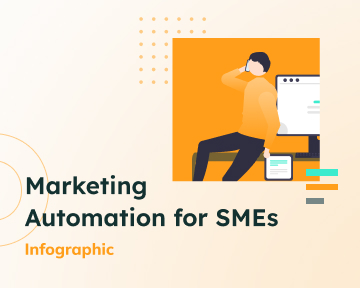Are you a small business (SMB) owner wondering which trends are shaping the landscape this year and beyond? In an ever-evolving business environment, staying ahead of the curve is crucial for success. Whether you’re an entrepreneur, a startup founder, or an established small business owner, it’s essential to keep a pulse on emerging trends that can propel your company forward.
We analysed various global business trends and forecasts for 2021-2023 and selected the most relevant ones for small businesses. These trends are most likely to grow in importance during 2023 and will continue to dominate further.
1. Personalisation and Customer Experience
Consumers today are expecting personalised experiences and small businesses are capitalising on this trend by offering customised products and adjusting their sales and marketing approach with tailored messaging. With the rise of e-commerce, small businesses will need to focus more on delivering a personalised, convenient, and seamless customer experience across multiple touchpoints of their customer journey.
Here’s how CRM and marketing automation softwares can help your business create more personalised touchpoints with your customers.
2. Social Media Marketing
Social media platforms have become a powerful tool for small businesses to promote their products. A well-executed social media marketing strategy will lead to increased visibility if the content is relevant and interesting for the target audience. Social media gives small businesses an opportunity to compete with larger companies for attention. The more your product or business is shown on social media within the right context, the more likely it will be remembered by potential customers and eventually be recalled when it comes to purchase.
Did you know?
71% of SMBs use social media to promote their business, and 52% of them post once a day.
Source: Hootsuite, 2022
3. Growth of Online Marketplaces
As more consumers turn to online shopping, small businesses may leverage online marketplaces such as Amazon, Lazada, Shopee, etc. to reach a broader audience and boost sales. Selling through a marketplace may provide SMBs with tools and opportunities that are typically unreachable to smaller retailers, such as well-designed loyalty programs, fast delivery and participation in special promotions. Sometimes, marketplaces can even be a way to reach foreign audiences and skip typical obstacles of cross-border trade.
Did you know?
Over 50% of the entire population of Malaysia relies only on online shopping via mobile devices to search, purchase, review and promote a product.
Source: Unicommerce 2023
4. Increased Adoption of Artificial Intelligence (AI)
The significance of Artificial Intelligence (AI) is growing for all businesses globally (read more about it in Business Trends 2023 post). Small businesses are increasingly using AI through applying AI-powered chatbots that can support faster and more efficient customer service. AI also can be used for content optimisation and designing personalised marketing campaigns. AI-driven personalised marketing campaigns can help build stronger connections with customers and increase brand loyalty, enabling scalability.
5. Subscription-Based Models
Small businesses are now offering subscription-based models to generate recurring revenue and build long-term customer relationships.
Here are some popular types of subscription-based models:
– Magazine subscription (the oldest subscription-based service!)
– Software and mobile apps (Adobe, Photoshop, various mobile games and services)
– Online education services
– Subscription box in e-commerce (eg., boxes with snacks and hobby sets)
6. Contactless Payment
The pandemic gave a big push towards the adoption of contactless payments by various businesses as a way to reduce contact between customers and employees. Mobile payments and digital wallets are providing a fast, more secure, and hygienic way to make purchases. However there are some myths surrounding this technology regarding its security that needs to be addressed carefully. In the near future customers may be expecting a variety of contactless options everywhere they go.
7. Cybersecurity and Data Privacy
As small businesses continue to rely on technology to manage their operations, the threat of cyber attacks and data breaches becomes more significant. Small businesses will need to invest in cybersecurity measures and data privacy protections to safeguard their operations and customer data.
Here are few ways how you can enforce cybersecurity of your business with current resources:
- Regularly update your software
- Use multifactor authentication
- Implement rules for secure use of devices
- Limit data and network access
- Train employees.
8. Financing Options
The pandemic brought difficult times for small businesses and those that survived are now experiencing a high demand for goods and services. High demand is a positive situation for small businesses – if they have the capital to hire enough people and ensure supplies to satisfy customer demand. At the same time traditional financing becomes more challenging to secure due to the global economic situation. Small businesses are seeking alternative financing options, such as crowdfunding, peer-to-peer lending, and revenue-based financing.
9. Increased Hiring and Remote Work
This trend is specific to SMBs: hiring challenges are impacting their ability to operate at full capacity. Meanwhile large companies with enough resources are proceeding with massive layoffs of extra headcount hired during the pandemic.
Remote and hybrid work offers a way for SMBs to access a wider pool of talent and hire the best people faster. With this option, businesses can access a more diverse pool of qualified candidates, including those who may not be able to relocate.
Did you know?
60% of SME CEOs are planning to increase headcount in the year ahead, with only 7% planning on reducing headcount.
Source: Forbes, 2023
10. Sustainability and Environmental Responsibility
SMBs represent 90% of all companies globally and if every small business takes steps towards sustainability, that will lead to a positive environmental change. SMBs are slowly recognising the value of their impact on growing environmental concerns from consumers. It is not only important to spread awareness and take steps towards solving environmental issues, but instead demonstrating that your product or business is eco-friendly can provide measurable benefits as customers are willing to pay extra to keep our environment clean. In fact, this is one of the main main trends of customer behaviours in Singapore.
Conclusions
The majority of the trends we went through are dictated by digital transformation. Success of small businesses will depend on their ability to adapt to new technologies and be flexible enough to serve clients within the digital space.
As a decision maker for a small business you can evaluate where your business stands within all the listed points. Is there something you can implement that will support your mid and long-term success?
Our team can help you to streamline your business processes via marketing automation, personalisation and analysing your leads behaviour. Reach out to us for free consultation now.
What's next for you?
As personalisation and customer experience are current trends for small businesses, discover via infographics how marketing automation and CRM software can improve your business’ weak points. Besides allowing us to personalise and automate your approach you will be able also to utilise leads data in a more effective way.





